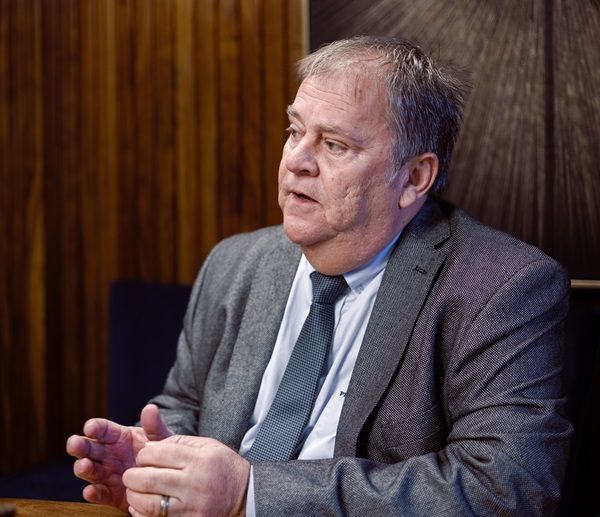"My greatest hope is that my contributions create ripple effects – opening doors for others, laying foundations for future breakthroughs, and helping shape a more just and resilient world for future generations."
These are the words of Prof Ian Rothmann, director of the North-West University's (NWU's) Optentia research entity, and newly rated B1 researcher by the National Research Foundation (NRF). This rating is reserved for internationally recognised researchers for the quality and impact of their work, and it signals that Prof Rothmann's scholarship is not only current but has also made a lasting contribution to his field.
"An NRF rating reminds you of the value of your work, but it also makes you reflect on your purpose," he says.
For Prof Rothmann, however, the true reward of academic life lies in building the capacity of others and contributing to change.
"I've come to realise that the heart of good research is about empowering others – it's not just about publishing papers, but also about investing in the capabilities of researchers and creating environments where people can flourish."
Reflecting on his tenure as the leader of Optentia, Prof Rothmann highlights the deeply formative experience of guiding an interdisciplinary entity. "My involvement with Optentia has greatly influenced me as a person and researcher," he explains. "Most academics are trained in discipline-related thinking, so to work in an interdisciplinary entity like ours takes a certain kind of maturity. You must learn to appreciate perspectives from various disciplines – and that's not always easy."
He recalls the initial difficulty of explaining Optentia's work to international colleagues. "I knew my field, but I didn't know theirs. Over time, I developed the skills and understanding to represent our interdisciplinary work more confidently. That's the beauty of Optentia – it teaches you that South Africa's major challenges, like poverty, inequality, and unemployment, cannot be tackled from a single disciplinary viewpoint. You have to take hands across disciplines."
He adds: "I hope my efforts have helped strengthen the NWU's reputation as a hub of research excellence that is deeply engaged with the pressing challenges of our time."
Prof Rothmann firmly believes that the foundation of excellent research lies in empowering people. "When we established the entity, we didn't say: 'Let's chase research articles.' We said: 'Let's invest in people and help them become as competent as possible.'"
This vision has guided Optentia's consistent focus on mentoring, skills development, and community-building among researchers. "Being a good researcher isn’t just about reading and writing. You need to be effective in how you do research – and that includes mastering statistical methods and understanding the broader context in which people live and work.”
Optentia is now recognised as a leader in research methodology and statistical training in South Africa. From hosting the country’s first “Stats Camp” in 2019 to recently convening a writing retreat attended by nearly 70 researchers – including 40 PhD students – the entity exemplifies how investing in people yields sustainable research impact.
“Optentia helps you to value the right things, enables you, and helps you achieve. Those three things are crucial for any research environment,” says Prof Rothmann.
Prof Rothmann draws strength from his personal values and relationships. “My friends and family are incredibly important to me,” he shares. “And I love visiting Namibia, where I was born – just being in nature is so revitalising.”
He also cherishes the quiet early hours of the morning. “Around 03:00 or 04:00 am is my favourite time. That’s when I have quiet time to read and immerse myself in academic books I otherwise wouldn’t have time for. It’s incredibly energising.”
Advice for the next generation
To emerging academics, Prof Rothmann offers this advice: “Firstly, get a mentor. There are people who are willing to support you – find them. Secondly, reflect on your purpose. Why are you here as an academic? Define your research vision in five words, but be open to adapting it over time. Life changes, and so should your vision.”
He also highlights the importance of being enabled and supported. “You need to value your work, be enabled to do it, and actually achieve. Sometimes people have the first two, but they don’t publish. That’s where mentorship becomes key – someone to guide you in refining your goals and managing your expectations.”
Looking ahead, Prof Rothmann is driven by a powerful institutional vision: “My vision for the NWU is to continue nurturing collaborative, innovative and socially relevant research that amplifies its impact both locally and globally.”
Much of his recent work explores how to enhance employability in a rapidly evolving world of work. “I want to understand how people can flourish – not only at work but in life,” he explains. “But in a country like South Africa, where 60% of young people are unemployed, we can’t only ask how people flourish at work. We must ask: how do we make people employable?”
His long-term ambition is to continue working at the intersection of employability, sustainability, and resilience. “With the rise of AI and technology, many jobs are under threat. We need to find ways to ensure people remain employable, despite rapid changes. That’s how we escape the trap of poverty, inequality and uncertainty.”

Prof Ian Rothmann
